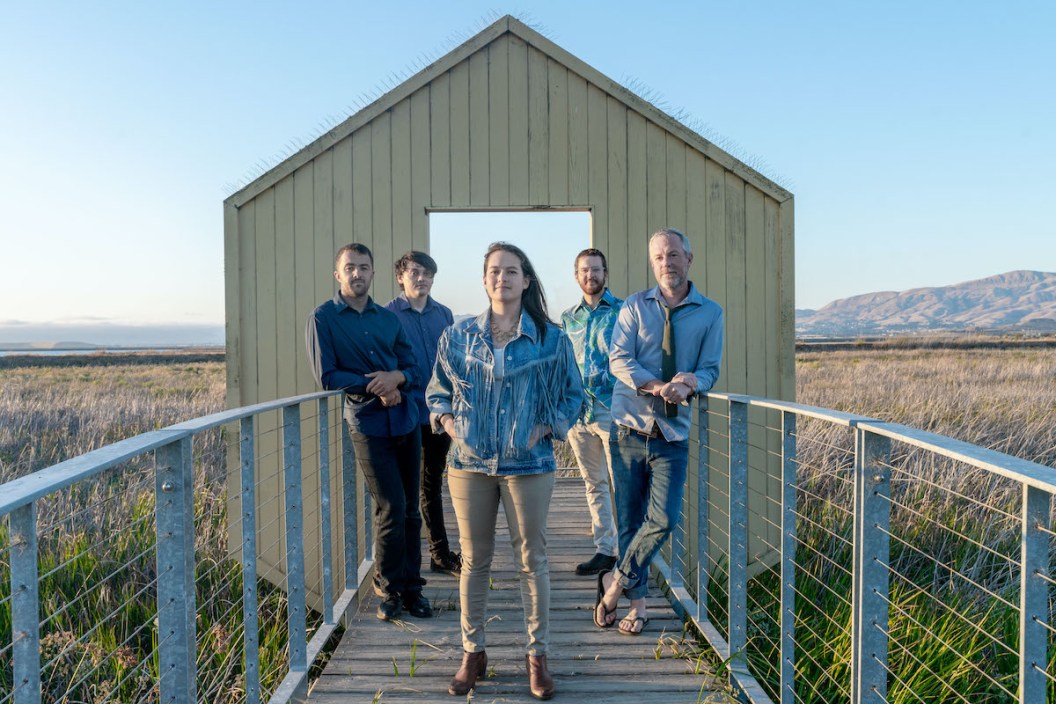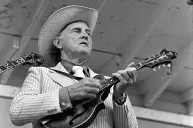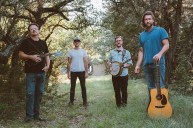AJ Lee & Blue Summit returned to its member's roots on one of the best albums of 2021, I'll Come Back. A more bluegrass-bound focus compared to that taken on the group's debut album, 2019's Like I Used To, didn't place AJ Lee (lead vocalist, primary songwriter and mandolinist), Sullivan Tuttle (guitarist), Jesse Fichman (guitarist), Chad Bowen (bassist) and Jan Purat (fiddler) in a restricting box. Instead, the award-winning, California-based five-piece charted new creative ground while building off its connection to one of the first families of 21st century bluegrass.
"We wanted to stay a little bit more close to home, in the bluegrass sense, just because the first album that we released, we were technically a four-piece," Lee told Wide Open Country. "It was me, Jesse, Sully and Chad. We didn't have Jan in the band at the time. We were kind of experimenting with maybe we could try a different genre. Let's try a little bit of electric guitar here. We have drums on about half of the first album. We were still kind of experimenting with our sound.
"But when Jan joined the band, everything locked into place and we were like, 'This is just like jamming when we were younger. This is what we like to do. We should just stick to doing what we are most comfortable with and what we like to do and develop that more instead of trying to delve into things that are kind of uncharted territory for us'," Lee continued. "We enjoyed making this album more because it seemed more familiar."
What's old hat for Lee dates back to a very young age, when her parents positioned her to follow in the footsteps of Alison Krauss and other former child prodigies by embracing bluegrass festival culture.
"It's a very inclusive type of music," Lee said of bluegrass scenes' embrace of budding talents. "The community is really supportive of everyone. It's the kind of music where you'll get in a circle to jam. The etiquette for bluegrass is you want to get as many people as possible who want to take a break on a song or to solo on a song... You give them the chance to do it. That's why [at] a lot of the jams, you'll have one song that goes on an extended amount because the etiquette is give this person a chance no matter where their skill level is because we want to support people and grow them in their musical journey. That's really encouraged among children and anybody older. You know, 75-plus. There's some people I know who just started picking up mandolin or guitar at that age."
By age 7, Lee entered educator and musician Jack Tuttle's sphere of influence. She soon earned a spot in the same band as Tuttle and his kids: Molly, Sullivan and Michael.
"The parents in the community knew of Jack Tuttle because he was a music teacher and he had a thing going on called the School of Bluegrass.," Lee explained. "Kids that he was teaching, he'd put on a few concerts here and there with them. He invited me to participate in the School of Bluegrass, and I did for a little while. Over time, he took an interest in me. We started doing The Tuttle Family Band and started calling it With Special Guest AJ Lee. I was Special Guest AJ Lee for a solid while, a few months maybe to a year or so. Then eventually I integrated and it became The Tuttles With AJ Lee."
Lee spent formative years with the Tuttle clan and in a collective of talented youngsters called OMGG (Obviously Minor Guys and a Girl). When future Americana trend-setter Molly Tuttle set out as a solo artist, it freed Lee and prior bandmate Sullivan Tuttle for the jam sessions that eventually led to the 2015 live debut of AJ Lee & Blue Summit.
"We formed because we were going on a hiatus with the Tuttles because Molly was moving to Nashville and starting her own career," Lee said. "The rest of us, we love music and we still hung around the community, but we weren't really in a dedicated band at the time. Sully and I hung out just because we'd been friends for a long time. We just figured, 'Let's play music together some more with a bunch of our friends.' It just kind of happened. We just were hanging out, and we're still doing the thing we love to do together."
Read More: Vince Gill Shares Why He Doesn't Perform His Own Material With The Eagles
Even when they tread familiar ground, Lee and her bandmates buck bluegrass convention. For instance, the group's two guitars, zero banjos lineup warrants a disclaimer of sorts in its bio.
"We put it in the bio just because we've been in the bluegrass community for a while," Lee explained. "That's sort of the thing. Some people are like, 'You play bluegrass but you got no banjo. What's up with that?' So originally the band when we formed, we didn't have a banjo player just because a lot of the members at the time, we were on hiatus and we were just hanging out with a bunch of friends and nobody in the group happened to be a banjo player at the time. Just because the chemistry is good with the configuration we have, we just never really thought to involve a banjo player. As we got a little bit more serious about pursuing a career with this band, we just decided that we don't really need a banjo player at this time. More so, it's easier to hop different genres, in our opinion, when you don't have one."
Not that straying from Earl Scruggs' instrument of choice displaces Lee from her comfort zone.
"[The Tuttles With AJ Lee] was significantly more traditional, but even in that band, we did have two mandolin players and Molly and Sully both played guitar," she added. "Really, I think they pioneered the double mandolin and guitar thing, sometimes with no banjo. In a lot of ways, they started it."
Indeed, I'll Come Back blends the familiar (Lee wrote "Not Gonna Cry Over You" during her time with the Tuttle family) with the band's harmony-driven vision for no-fences bluegrass.
"We had a lot of freedom, especially because I'm the primary songwriter of the band," Lee said. "I try my best to keep things as original and fresh as possible. It's not like we were going to go into the studio and just recreate a bunch of traditional bluegrass songs. I think there's a lot of opportunity to experiment with acoustic jamgrass sort of stuff, similar to what Billy Strings is doing. He's a string band [musician], but he's doing a lot of new stuff that people really haven't seen before and people seem to really dig it."




